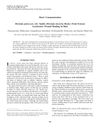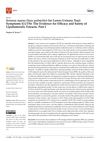 140 citations,
February 2020 in “Frontiers in Plant Science”
140 citations,
February 2020 in “Frontiers in Plant Science” RNAi-based biopesticides could be safe and effective for pest control with careful development and risk assessment.
 75 citations,
January 2014 in “Archiv Der Pharmazie”
75 citations,
January 2014 in “Archiv Der Pharmazie” Jasmonic acid and its derivatives play important roles in plant health and have potential uses in medicine and agriculture.
 55 citations,
September 2017 in “Expert Opinion on Drug Discovery”
55 citations,
September 2017 in “Expert Opinion on Drug Discovery” Different factors affect where drugs are absorbed in the small intestine, which is important for effective medication use.
 40 citations,
January 2010 in “Indian Journal of Dermatology, Venereology and Leprology”
40 citations,
January 2010 in “Indian Journal of Dermatology, Venereology and Leprology” Certain diets can affect skin conditions, but more research is needed to understand these relationships fully.
 34 citations,
February 1992 in “The Journal of Clinical Endocrinology and Metabolism”
34 citations,
February 1992 in “The Journal of Clinical Endocrinology and Metabolism” Finasteride and minoxidil together promote hair growth better than either alone.
 16 citations,
September 2018 in “Journal of Ethnopharmacology”
16 citations,
September 2018 in “Journal of Ethnopharmacology” Plant-based remedies may treat hair loss by reducing inflammation and improving insulin resistance.
 11 citations,
January 2013 in “Postępy Dermatologii i Alergologii”
11 citations,
January 2013 in “Postępy Dermatologii i Alergologii” The conclusion is that a combination of noninvasive treatments and lifestyle changes can improve skin health during menopause.
 11 citations,
December 2020 in “Notulae botanicae Horti Agrobotanici Cluj-Napoca”
11 citations,
December 2020 in “Notulae botanicae Horti Agrobotanici Cluj-Napoca” Mycorrhizal fungi and shading improve tea plant growth and nutrient uptake by changing hormone levels and gene expression.
 3 citations,
January 2017 in “Revista chilena de nutrición”
3 citations,
January 2017 in “Revista chilena de nutrición” Certain natural compounds called terpenes may help prevent prostate cancer.
 2 citations,
September 2023 in “Frontiers in sustainable food systems”
2 citations,
September 2023 in “Frontiers in sustainable food systems” Traditional knowledge of edible oil-producing plants in Sinja Valley is declining due to outmigration and sociocultural changes.
 1 citations,
December 2022 in “Türk tarım - gıda bilim ve teknoloji dergisi”
1 citations,
December 2022 in “Türk tarım - gıda bilim ve teknoloji dergisi” Diversifying tea products can boost profits and meet global market demands.
 January 2025 in “International Journal of Advanced Research in Science Communication and Technology”
January 2025 in “International Journal of Advanced Research in Science Communication and Technology” Polyherbal hair dyes are safer and more eco-friendly than chemical dyes.
 November 2023 in “International journal of biology, pharmacy and allied sciences”
November 2023 in “International journal of biology, pharmacy and allied sciences” Herbal treatments can help with hair problems, but more research is needed.
 October 2023 in “Cognizance journal”
October 2023 in “Cognizance journal” The document suggests using natural remedies like bloodletting and honey for various health issues but lacks scientific evidence for their effectiveness.

Custom skincare can be made based on genes, fewer cats in Lublin have FeLV/FIV than national average, and studies also looked at small water bodies, river pollution, guppy growth, toxins in biochars, palm oil issues, and pumpkin seed oil for hair strength.
 January 2023 in “Journal of pharmacognosy and phytochemistry”
January 2023 in “Journal of pharmacognosy and phytochemistry” Herbal home remedies can effectively treat hair loss with fewer side effects.
 January 2020 in “Elsevier eBooks”
January 2020 in “Elsevier eBooks” Plant-based chemicals may help hair growth and prevent hair loss but need more research to compete with current treatments.
 January 2020 in “Asian Journal of Basic Science & Research”
January 2020 in “Asian Journal of Basic Science & Research” Nutrease powder, a high-protein, low-carb supplement, can help manage Polycystic Ovary Syndrome symptoms, regulate periods, improve ovulation, and restore fertility.

Researchers found a genetic link for hereditary hair loss but need more analysis to identify the exact gene.
 January 2021 in “Middle East journal of applied sciences”
January 2021 in “Middle East journal of applied sciences” Zinc is essential for plant growth and human health, but many soils lack enough zinc, affecting crops and potentially leading to health problems.
May 2024 in “Frontiers in Nutrition” Turning food waste into useful products is key for a sustainable economy.
 5 citations,
October 2022 in “Frontiers in bioengineering and biotechnology”
5 citations,
October 2022 in “Frontiers in bioengineering and biotechnology” Ro stress hindered ginseng root growth and ginsenoside production, but increased certain hormones and affected gene regulation related to plant growth and stress responses.
 1 citations,
April 2023 in “Biomolecules”
1 citations,
April 2023 in “Biomolecules” Fermented papaya and mangosteen in hair care products helped prevent hair loss and improve hair thickness.
 35 citations,
December 2006 in “Journal of medicinal food”
35 citations,
December 2006 in “Journal of medicinal food” Morinda pubescens fruit extract helps wounds heal faster in rats.
 4 citations,
January 2022 in “Journal of nanomaterials”
4 citations,
January 2022 in “Journal of nanomaterials” Silver nanoparticles made from Ziziphus nummularia fruit extract promote hair growth and fight bacteria and fungi.
 1 citations,
December 2022 in “Pharmaceuticals”
1 citations,
December 2022 in “Pharmaceuticals” Noni fruit extract, specifically the FEA-3 sub-fraction, can increase hair growth and reduce baldness in male rabbits, potentially acting like common hair loss treatments.
 19 citations,
August 2010 in “Journal der Deutschen Dermatologischen Gesellschaft”
19 citations,
August 2010 in “Journal der Deutschen Dermatologischen Gesellschaft” Certain plant extracts can effectively treat skin conditions like athlete's foot, chronic vein problems, sun damage, skin growths, vitiligo, and hair loss, and may also improve skin appearance.
 31 citations,
January 2017 in “Phytotherapy Research”
31 citations,
January 2017 in “Phytotherapy Research” Ziziphus jujuba Mills may have health benefits, but more research is needed to confirm its safety and effectiveness.
 6 citations,
October 2017
6 citations,
October 2017 Indian Gooseberry has potential for cancer prevention and treatment and promotes hair growth.
 2 citations,
July 2021 in “Uro”
2 citations,
July 2021 in “Uro” Saw palmetto extract is generally safe and can effectively treat Lower Urinary Tract Symptoms, but its evaluation is affected by varying quality and a need for long-term studies.





























